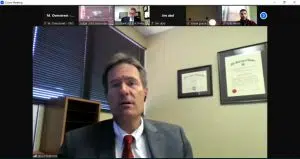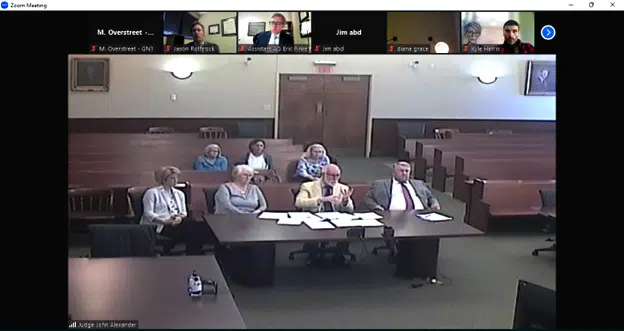BY MELINDA J. OVERSTREET
GLASGOW NEWS 1
43rd Circuit Judge John T. Alexander told a mother and daughter who are co-defendants in a homicide case, along with others in his courtroom in person and via Zoom streaming service Thursday afternoon, that he would take motions to suppress their indictments, particularly the mother’s, under further consideration before issuing a written decision.
Donna Logsdon and her daughter Leighanne Bennett were in Barren Circuit Court with their attorneys Johnny Bell and Martin Peterson for a hearing that lasted a bit more than an hour to determine whether the case(s) can move forward with the Jan. 13 indictments issued by a Barren County grand jury. They stand accused of killing Michael “Mickey” Logsdon – husband and father, respectively, to them in July by turning off his breathing machine.
John Gardner, commonwealth’s attorney for the 43rd Circuit, which is Barren and Metcalfe counties, had requested a special prosecutor for Leighanne Bennett’s case due to a potential conflict of interest, and Jason Rothrock and Eric Finke, both assistant attorneys general, are serving in that capacity. They joined the proceeding via Zoom.
The defense has suggested that the wording in the indictments are insufficient and/or improper because they are both charged as a principal of murder but also charged as an accomplice to the other one, and has questioned some of the “factual” items, such as whether the machine was “needed” to breathe or merely assisted with it.
The almost-identical wording in the documents is that the defendants, respectively, “acting alone or in cooperation with another, committed the crime of murder when she or an accomplice unlawfully killed Michael Logsdon by turning off his BIPAP machine, which he needed to breathe.” One indictment says “offense” rather than “crime,” for example.
This point was argued by the prosecution more so in the court filings than in the proceeding Thursday, but they state that the death certificate lists cause of death as “Asphyxia, Suffocation, BI-PAP machine turned off,” and those last four words were repeated in the section of the certificate that asks for a description of the how the injury occurred. Further, the autopsy report concluded that the death of Mickey Logsdon, “a 75-year-old man with a history … requiring continuous use of BiPAP machine is attributed to asphyxia via suffocation due to BiPAP machine being turned off and on.”
Another of the defense’s arguments is Rothrock had not been assigned to prosecute Donna Logsdon’s case when she was indicted because Gardner had not filed the paperwork to request a special prosecutor for her case, but Rothrock later responded that, basically, prior to her being indicted, there was no case charging Donna Logsdon from which Gardner could have recused himself and for which he could have requested a special prosecutor.

Jason Rothrock, one of two special prosecutors who are assistant attorneys general for the commonwealth, in the case in which Leighanne Bennett and Donna Logsdon are charged with murder, speaks during a hearing in Barren Circuit Court on Thursday in this screenshot from Zoom.
Also, Bell has said that Rothrock told him he did not intend to present any allegations against Donna Logsdon to the grand jury.
Rothrock said he presented approximately 3 hours and 44 minutes of testimony and evidence to the grand jury.
“I was not necessarily seeking an indictment against Mrs. Logsdon; I was presenting evidence against Mrs. Bennett, and the grand jurors decided to indict Mrs. Logsdon also. And at that point, from a common-sense standpoint, I don’t know what was supposed to do. You know, I don’t know if I was supposed to say, ‘No, I’ve been appointed on the Leighanne Bennett case, so I’ll have to get Mr. Gardner to come over here and deal with this indictment you want to do on Mrs. Logsdon,’ even though I knew that he already had a conflict, and, you know, the conflict was intertwined. We’re talking about mother and daughter in this case, and the conflict actually involved Mrs. Logsdon’s [other] daughter and Mrs. Bennett’s sister,” he said.
Based on the testimony Thursday, Donna Logsdon was subpoenaed to testify to the grand jury in her daughter’s case, but she declined when the time came, invoking the 5th Amendment right to not self-incriminate.
“They called her into the grand jury after issuing a subpeona for her to appear or to be available, but once her attorney informed the [prosecutor] that she would not be offering any testimony, there was no need to have her appear before the grand jury because they weren’t going to learn anything from her other than that she was exercising her constitutional right,” Peterson said. “We believe that so infected the grand jury process that the court should seriously consider dismissing the indictment as a result.”
He discussed previous cases in which the courts found that witnesses should not be called to testify for the sole reason of, essentially, setting them up for prejudice in the eyes of the jury panel.
Rothrock’s testimony noted above was reiterated to point out that there was no actual case against her at the time she was called to testify and thus no intent of potentially prejudicing of the panel.
The defense contended that under the circumstances of her invoking that privilege, the prosecution should have provided an instruction to the grand jury about how her not testifying should not result in their having an adverse influence.
In discussions regarding that point, Alexander said he’d not found anything in his research to indicate it was incumbent upon the prosecution to do that with a grand jury like it would be with a trial jury. Essentially, that cautionary instruction is to be used with the deliberative body determining whether a person is actually guilty, and that is not the grand jury’s job.
A new pretrial conference for the case(s) was set for May 22, and Alexander said he anticipated having his written decision regarding the indictments sufficiently before then that they could discuss any lingering questions about it at that time.

Comments